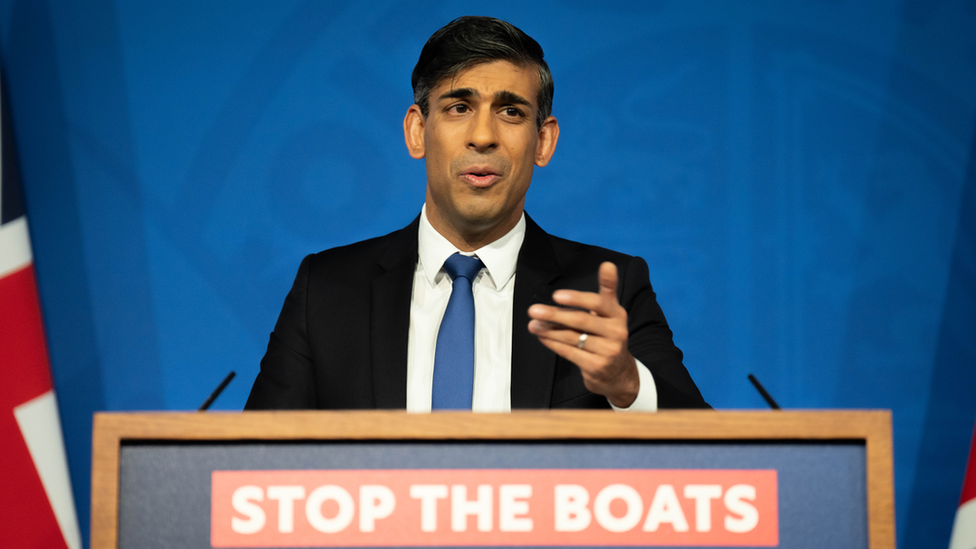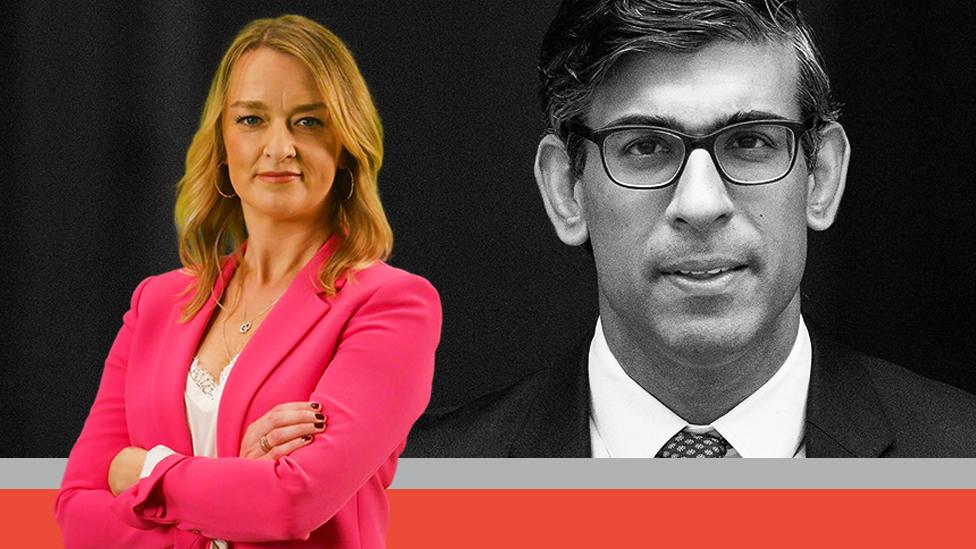Kuenssberg: New year, new tactics but old problems for Sunak
- Published

Detail matters. Decisions matter.
Rishi Sunak's every action as prime minister shapes public opinion about him in this crucial general election year, when you'll have your say on his performance.
We'll explore this more in our interview with him on Sunday.
But perhaps the biggest factor in his success or failure is much harder for him to get his hands around.
There is a sense in every nook and cranny of Westminster that changing the mood is almost impossible, given how many things have gone wrong.
A view that decline has taken hold is most definitely in fashion. That is what the polls and newspaper columns say - and so, privately, do many MPs.
And with yet another Tory MP walking away - this time former minister Chris Skidmore - it's almost as if Conservative MPs are carrying out their own painful slow motion general election by creating by-election after by-election after by-election. Losing heart, or leaving in disgrace.
How then is Mr Sunak going to try to turn you back to his party?
This isn't going to be a year of big new plans or policies from Number 10, insiders say. That all happened last year - the next few months is about hoping they'll have the desired results.
The obvious big exception is the plan to send migrants to Rwanda, which is still miles from happening, and faces more political and legal battles.
It is an even trickier sell now we know more about Mr Sunak's own doubts at the start of the scheme.

Chris Skidmore, formerly in charge of the government's Net Zero agenda, is quitting as an MP over the decision to allow new oil and gas licences
But the 2024 election warmup plan will feature the prime minister on the road much more - three times a week I'm told - meeting as many voters as possible face to face, and telling the story of the progress he believes he is making.
This is yet another change of approach. At the start there was stop-the-chaos reasonable Rishi, then the "real Rishi", then "I'm the change Rishi", and there will now be "Rishi on the road".
Will it have an effect?
Mr Sunak's personal ratings got worse when the public began to see more of him after he entered Number 10 - so there is nothing obvious that suggests the public seeing even more of him will help.
What will the message be? Conservative MPs gave me some helpful, and less helpful, suggestions:
"Secure the recovery" or "securing the future" are some of the more sober ideas
"Things can only get better" - a reference to the New Labour anthem and an admission from one senior MP that the picture is less than rosy
"We're a bit crap but they'd be tons worse" - an idea from one MP that is both damning but loyal
"May the 2024th be with you", another idea from a former minister for the Star Wars-loving PM
Or "Drink up!" - a joking suggestion from a cabinet minister that it is time for the Conservatives to go
The message you will actually hear will be more and more pointed towards Sunak's Labour opponents.
When we speak to Rishi Sunak on Sunday, I expect the slogan we will hear is "don't risk it" - urging voters not to take a chance on the Labour Party.
That's not exactly a revolutionary sentiment from a Conservative government trying to hang on to power.
But given the public mood, and the number of big problems the government has to face, promising the earth might just not be credible.
Chiming with history
Conservatives are often unimpressed with Keir Starmer, and frequently grateful he is their opponent.
But many of them share his description of the public mood.
He said this week there was a sense that politics just doesn't work anymore. That the country is "exhausted, tired, despairing" and that "nobody believes you can make a difference".
If you are, like me, a proud political anorak, that might have rung a bell.
Once upon a time there was another opposition leader, who had spent a few years in charge trying to shake up his party after it had been out of power for 13 years.
This leader opened their party's manifesto with the following lines: ''People have lost faith that politics can fix our problems, or that politicians can lead us into a better future. There is a feeling of helplessness. Once again, there is a mood afoot that the decline of Britain is inevitable."
I doubt Keir Starmer would enjoy the comparison, but his words were remarkably similar to the start of David Cameron's 2010 Tory manifesto.

On this week's show are Prime Minister Rishi Sunak and Labour's shadow education secretary Bridget Phillipson
Watch live on BBC One and iPlayer from 09:00 GMT on Sunday
Follow latest updates in text and video on the BBC News website from 08:00

The core problem for then-PM Gordon Brown was that Labour, after changing prime minister, seemed exhausted after 13 years in charge. Out of ideas, and scarred by its own vendettas and personal battles.
There had been a terrible emergency, the financial crash, and the government seemed ill-equipped to meet the challenges people faced.
And there was an opposition leader who seemed a reasonable sort of chap to most members of the public, determined to make the most of that opportunity to offer the elusive "change".
Sound familiar?
'Only way is up'
Don't forget the inevitable but critically important caveats. Eleven months in politics is an absolute age.
(If you fancy taking a punt, 14 November is not a bad bet for the general election as things stand. But do not, under any circumstances, hold me to that. So much could change. Rishi Sunak also absolutely did not rule out a spring election this week.)
Voters are volatile and you'd need your head read to make any solid predictions at this stage.
Back at our 2010 parallel - David Cameron failed to win outright. And Labour needs to overturn more seats than Lord Cameron to get the same result.
And while Labour's lead in the polls is huge, for now, there are hordes of voters still undecided.
But even Tory election chiefs are saying their path to victory is "steep and narrow". , external
As one final Conservative MP's slogan suggested: "The only way is up".
After the woes of 2023, the prime minister who wants to win a historic fifth term for his party will hope that proves to be true.

What questions would you like to ask the prime minister this Sunday?
In some cases your question will be published, displaying your name, age and location as you provide it, unless you state otherwise. Your contact details will never be published. Please ensure you have read our terms & conditions and privacy policy.
Use this form to ask your question:
If you are reading this page and can't see the form you will need to visit the mobile version of the BBC website to submit your question or send them via email to YourQuestions@bbc.co.uk, external. Please include your name, age and location with any question you send in.
Related topics
- Published6 January 2024

- Published11 November 2023

- Published16 December 2023

- Published5 January 2024
